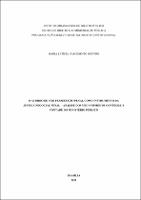Use este identificador para citar ou linkar para este item:
https://repositorio.idp.edu.br//handle/123456789/3175| Título: | O acordo de não persecução penal como instrumento da justiça negocial penal: análise dos mecanismos de controle à vontade do Ministério Público |
| Autor(es): | Gontijo, Maria Letícia Nascimento |
| Orientador(es): | Vasconcellos, Vinícius Gomes de |
| Palavras-chave: | Justiça criminal negocial;Acordo de não persecução penal;Ministério Público;Mecanismos de controle ao acordo;Processo penal |
| Editor: | IDP/EAB |
| Citação: | GONTIJO, Maria Letícia Nascimento. O acordo de não persecução penal como instrumento da justiça negocial penal: análise dos mecanismos de controle à vontade do Ministério Público. 2021. 157 f. Dissertação (Mestrado em Direito Constitucional) Instituto Brasileiro de Ensino, Desenvolvimento e Pesquisa, Brasília, 2021. |
| Resumo: | O tema central da pesquisa é o acordo de não persecução penal (ANPP), mecanismo inserido
no Código de Processo Penal pela Lei 13.964/2019, que contempla requisitos objetivos e
subjetivos, e também uma cláusula aberta para sua aplicação, quando o órgão ministerial
entender “necessário e suficiente para a reprovação e prevenção do crime”, o que pode ensejar
atuação discricionária com indevidos subjetivismos que podem violar o princípio da isonomia.
A partir de revisão bibliográfica, esta dissertação pretende analisar criticamente o instituto e
sua conformação com a base principiológica constitucional que orienta o processo penal
brasileiro, examinando os limites e os mecanismos de controle à vontade do Ministério Público,
a fim de evitar eventuais violações de princípios e direitos dos acusados. Pretende-se responder
aos seguintes problemas: (i) qual a natureza jurídica do acordo de não persecução penal?; (ii) o
acordo de não persecução penal é direito subjetivo do investigado?; (iii) como conformar a
aplicação do mecanismo consensual aos ditames constitucionais?; (iv) quais os limites à atuação
do Ministério Público na aplicação do ANPP?; (v) quais os mecanismos de controle à atuação
ministerial? Em conclusão, sustenta-se que o ANPP é um negócio jurídico processual que
encerra um poder-dever do Ministério Público, e não é direito subjetivo ao imputado, diante do
exercício da oportunidade legalmente regulada pelo órgão de acusação. Defende-se que o
imputado apenas tem direito à fundamentação da decisão ministerial pelo cabimento ou não do
ANPP no caso em concreto. Pensa-se que, para diminuir os prejuízos decorrentes da
relativização das garantias processuais pela aplicação do mecanismo, deve-se limitar a atuação
do Ministério Público a partir de critérios legais, e viabilizar mecanismos de controle interno e
externo da atuação ministerial. Assim, normativos internos ao órgão que uniformizem o
procedimento de atuação devem ser estabelecidos, tendo como norte as garantias
constitucionais. Para além dos mecanismos de controle interno, defende-se a atuação efetiva da
defesa técnica, e profícuo controle jurisdicional das avenças como meios para controlar a
atuação do órgão acusatório nos espaços de consenso demasiadamente amplos do ANPP e
conformar a sua aplicação aos ditames constitucionais. |
| Abstract: | The central theme of the research is the non-criminal prosecution agreement (ANPP), a mechanism included in the Code of Criminal Procedure by Law 13.964/2019, which includes objective and subjective requirements, and also an open clause for its application, when the ministerial body understands “necessary and sufficient for the reproach and prevention of crime”, which can give rise to discretionary action with undue subjectivism that may violate the principle of isonomy. From a bibliographical review, this dissertation intends to critically analyze the institute and its conformation with the constitutional principle base that guides the Brazilian criminal process, examining the limits and control mechanisms at the will of the Public Ministry, in order to avoid possible violations of principles and rights of the accused. It is intended to answer the following problems: (i) what is the legal nature of the non-criminal prosecution agreement?; (ii) is the non-criminal prosecution agreement a subjective right of the investigated?; (iii) how to conform the application of the consensual mechanism to constitutional dictates?; (iv) what are the limits to the action of the Public Ministry in applying the ANPP?; (v) what are the control mechanisms for ministerial action? In conclusion, it is argued that the ANPP is a procedural legal transaction that entails a power-duty of the PublicMinistry, and is not a subjective right to the accused, given the exercise of the opportunity legally regulated by the prosecution body. It is argued that the accused is only entitled to justify the ministerial decision as to whether or not the ANPP is appropriate in the specific case. It is believed that, in order to reduce the damages resulting from the relativization of procedural guarantees through the application of the mechanism, the action of the Public Prosecutor's Office should be limited based on legal criteria, and make possible mechanisms for internal and external control of ministerial action. Thus, internal regulations for the body that standardize the operating procedure must be established, based on constitutional guarantees. In addition to the internal control mechanisms, the effective performance of technical defense is defended, and the fruitful jurisdictional control of covenants is defended as a means to control the action of the accusatory body in the ANPP's overly broad consensus spaces and conform its application to constitutional dictates. |
| URI: | https://repositorio.idp.edu.br//handle/123456789/3175 |
| Aparece nas coleções: | Mestrado Acadêmico em Direito Constitucional |
Arquivos associados a este item:
| Arquivo | Descrição | Tamanho | Formato | |
|---|---|---|---|---|
| DISSERTAÇÃO_MARIA LETÍCIA NASCIMENTO GONTIJO_MESTRADO EM DIREITO CONSTITUCIONAL.pdf | 1.56 MB | Adobe PDF |  Visualizar/Abrir |
Os itens no repositório estão protegidos por copyright, com todos os direitos reservados, salvo quando é indicado o contrário.
